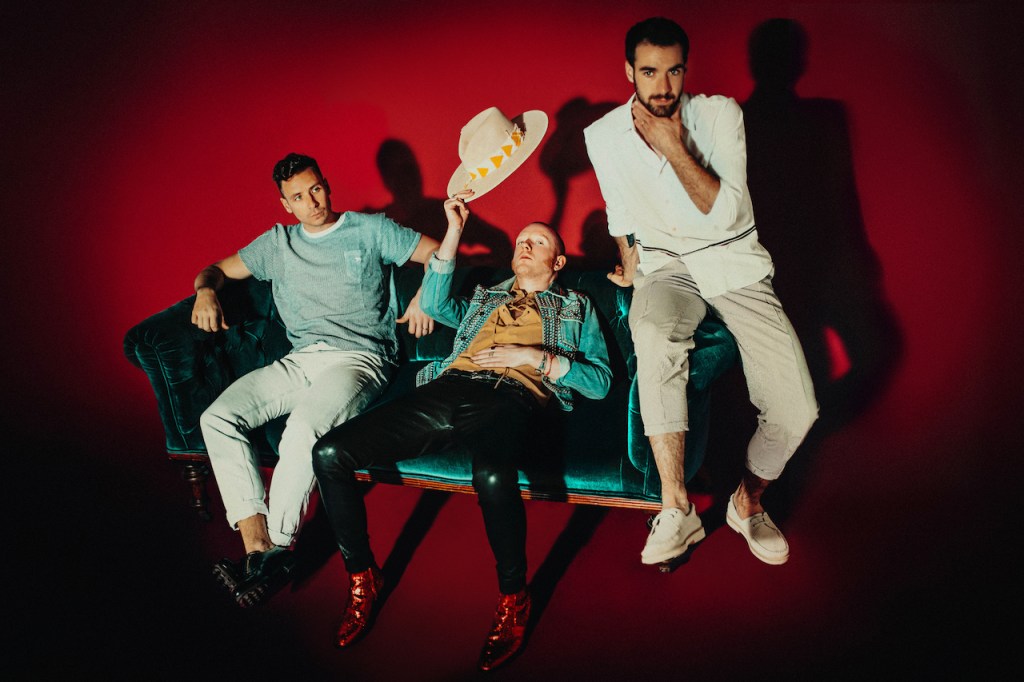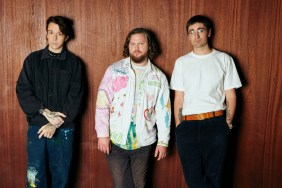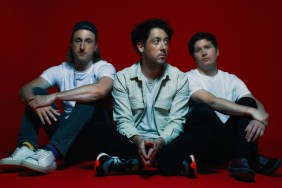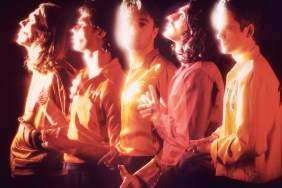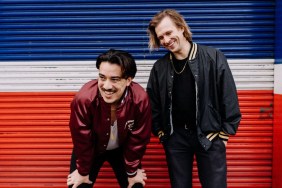Two Door Cinema Club’s third album, Gameshow, came out in late 2016. It was their first through major label, Parlophone, after two via French boutique label, Kitsuné. It was a short-lived arrangement, however, and the Northern Irish trio’s fourth LP was released by Prolifica Inc., a new label run by their management. Despite the return to an indie setup, False Alarm features some of the most pop- oriented songs of the band’s career.
Songwriter and lead vocalist Alex Trimble is boldly positioned atop a variety of locomotive synths, guitars and bass grooves provided by bandmates Sam Halliday and Kevin Baird. Beneath the pop veneer, the influence of disco, rock, funk and soul shines through.
Lyrically, the record reflects the prevailing uncertainty in global politics, as well as the contemporary dependency on social media. But amid these inquiries, the Belfast band sound united. Music Feeds speaks to lead guitarist Halliday.
Music Feeds: The band’s been in the public eye for over a decade now. You were still teenagers when you started out. As you grow older, your priorities and perspective changes. Are the three of you still on the same page in terms of your commitment to the band?
Sam Halliday: We’ve definitely all changed over the years and musically we are into quite different things, but I think that really makes the whole thing so much more interesting. We had a couple of years off [after Beacon] and I think it allowed us to sit back and take stock. And actually on the last campaign with Gameshow we enjoyed
the touring a bit more. I think when you have a couple of years off from travelling, you start to miss it a bit and then can appreciate the fact you get to go to all these cool places and you start to actually leave your hotel room on days off.
MF: You play with other musicians in your live shows, but Two Door Cinema Club is an interesting entity for never having included a full time drummer. What’s the reason for that – are you wary of messing with the three-piece dynamic? Or is it purely a practical thing?
SH: The three of us have been in bands and we’ve been pals since we were 15. We’ve been through a lot as a tight unit. It would just be strange to bring somebody else in. I think also with four people, you always split decisions. If you have three there’s always an odd number there to make a decision.
MF: False Alarm is your third successive album made with LA-based, Irish producer Jacknife Lee. Was there much discussion about who would produce the album, or do you feel like you’ve found your George Martin-equivalent in Jacknife Lee?
SH: With Gameshow, we could never have made that album without Jacknife Lee. I think Alex was finding it particularly difficult at that point to be creative. He had almost like a mentor role as well as producer. He really helped him get creative again after a long time off. The connection they have now is beyond us ever trying anything else out.
MF: Jacknife Lee is renowned for his work with U2, Bloc Party, Snow Patrol, Taylor Swift and many more. What is your relationship like with him?
SH: He’s just on the same page musically. He’s such a music fan to the point where I think I could never keep up with him. He just buys records and has an insane record collection and an insane appetite for music. He’s a very inspiring person to be around. There was a playlist that he made for us for this album, like, “Here’s things that I think you guys would like,” and you just couldn’t get through it before he would top it up.
MF: How early in the False Alarm process did you start liaising with him and asking for input?
SH: I think it was the longest process from start to finish that we’ve had apart from the first album. From a very early point Alex went to LA and worked on the demos with Jacknife Lee to develop them into more structured songs. That allowed a lot more time for messing about and working out crazy synth sounds and just a bit more experimentation. I think that’s really evident on the album. Whenever there was structures in place, more developed songs, Alex would send me and Kevin them through and we’d work on our parts along with that. Then we met up in London for a couple of weeks in RAK Studios with Jacknife as well and had a proper recording session. It was different process, but I think it worked really well and it’s definitely allowed for a bit more experimentation.
MF: You’ve showed a willingness to experiment and incorporate new sounds on each of your four albums, but you hang onto a distinctive sound. Are there artists you look up to who have continually evolved while hanging onto their essence?
SH: Classically, Bowie and Prince and Michael Jackson and Madonna. Those sorts of pop stars are able to do it a lot easier than bands. It’s probably to our benefit that we’ve never really been part of a scene. At the start it was something we were annoyed about. Other bands were part of this scene and they would get certain gigs, and we were always on the outside of that. But I think long term it’s been a real benefit – scenes go out of fashion and we’ve been lucky to be on the outskirts of that.
Not having a drummer in the early days was incentive for us to do whatever we wanted. We had to make these backing tracks to play along to live and it gave us the freedom to do whatever we wanted. The only people that really had backing tracks in the early days were pop stars. So it allowed us to bring different elements in there. So even though we were two guitars and a bass most of the time, we had loads of synthesisers going on anyway in the backing track. It lent itself to a more dancey sort of thing, rather than just a straightforward rock band or an indie band.
–
Two Door Cinema Club’s new album False Alarm is out now. The band will return to Australia this November for a headline tour as well as a stop at this year’s Grapevine Gathering.
